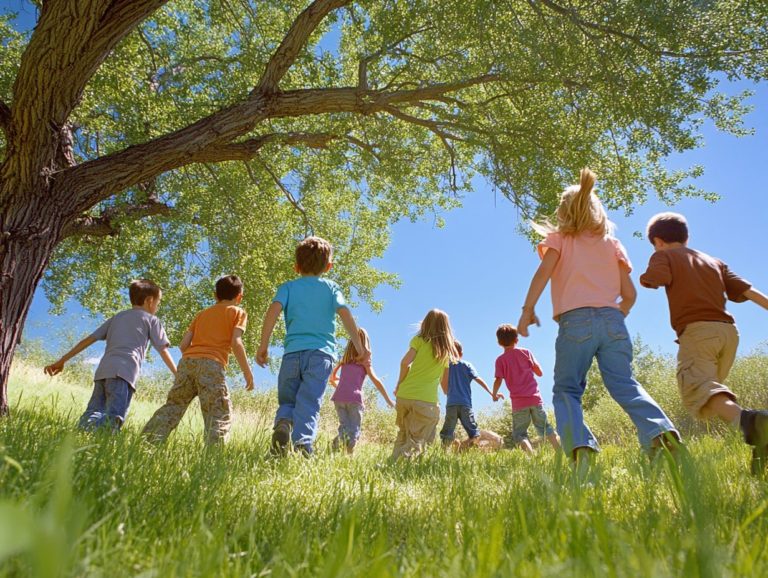How to Encourage Teamwork in Family Activities
Teamwork extends far beyond the confines of the office or sports fields; it serves as a crucial element in strengthening family bonds through shared family activities and engaging in fun challenges.
When you work together on tasks, you foster communication, trust, and creativity, transforming ordinary moments into lasting memories. This discussion delves into the significance of teamwork in family activities, including creative problem solving and the myriad benefits it offers.
You ll discover practical tips to encourage collaboration, along with a range of enjoyable family activities that promote teamwork. Embrace this journey to elevate your family connections through the power of teamwork!
Contents
- Why is Teamwork Important in Family Activities?
- What are the Benefits of Teamwork in Family Activities?
- How to Foster Teamwork in Family Activities?
- What are Some Family Activities that Promote Teamwork?
- Frequently Asked Questions
- How can I encourage teamwork in family activities?
- What are some fun family activities that promote teamwork?
- How can I get my children to work together during family activities?
- Why is teamwork important in family activities?
- What should I do if there is conflict between family members during an activity?
- Can teamwork be taught through family activities?
Key Takeaways:
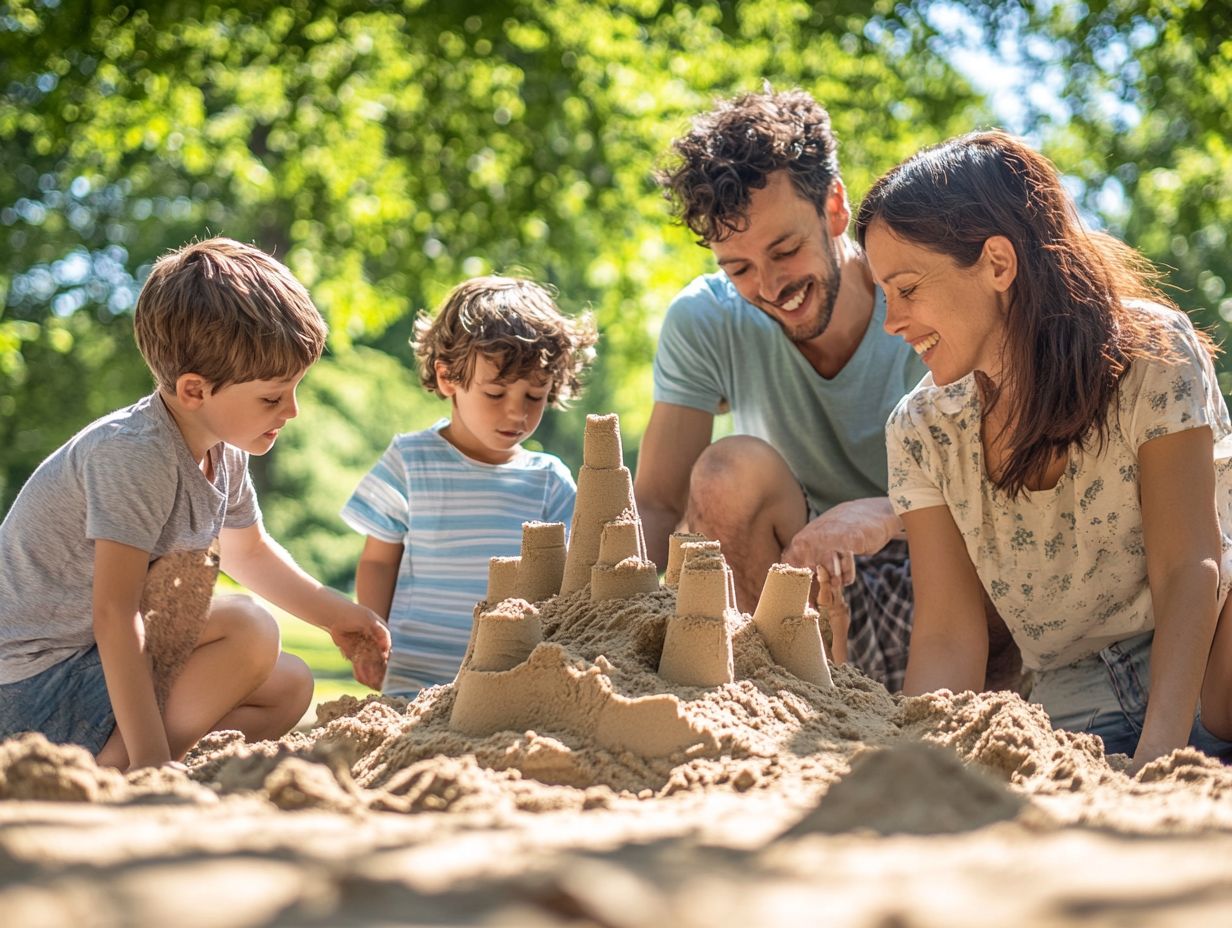
- Teamwork in family activities promotes bonding and communication, teaches cooperation and problem-solving skills, and builds trust and respect.
- To foster teamwork, set clear goals and expectations, assign roles and responsibilities, encourage open communication, emphasize the importance of listening, and celebrate successes while learning from failures.
- Cooking together, outdoor adventures, DIY projects, game nights, and volunteering are some family activities that promote teamwork.
Why is Teamwork Important in Family Activities?
Teamwork plays an important role in family activities, helping family members work together and strengthen their relationships. When you take part in team-building exercises, you not only enhance communication skills but also face enjoyable challenges together, which cultivates a sense of unity and shared experience. Incorporating skit presentations and role-playing can add to the fun.
As your family works side by side be it through outdoor adventures or indoor games you create lasting memories that contribute to your family goals and deepen emotional connections.
Activities like scavenger hunts, puppet theatre, or creative problem-solving exercises encourage relationship building while introducing playful challenges that can stimulate creativity and innovation within your family.
What are the Benefits of Teamwork in Family Activities?
The benefits of teamwork in family activities are truly remarkable, fostering improved communication skills, stronger bonds, and enhanced problem-solving abilities.
When you engage in collective challenges like cooking together or tackling obstacle courses, you not only build trust among family members but also spark healthy competition and group collaboration.
As you navigate through creative problem-solving tasks, you come to appreciate each other s strengths, deepening your understanding of how family members interact with each other and the joy of collaboration.
These shared experiences lay a solid foundation for building relationships, ensuring that those family ties only grow stronger with time.
1. Promotes Bonding and Communication
Promoting bonding and communication is one of the key advantages of teamwork in family activities. Fun challenges, like family trivia or memory charades, serve not only to enhance your communication skills but also to create cherished moments together.
These activities encourage everyone to express their ideas and feelings openly, paving the way for meaningful conversations. Participating in cooperative games or cooking together doesn t just build teamwork; it also opens the door to exploring different personalities and perspectives within your family.
When you collaborate on projects like DIY crafts or gardening, you begin to appreciate each other s strengths and weaknesses, which in turn builds trust and empathy. Over time, these shared experiences can significantly enhance emotional expression, enabling your family to navigate challenges more effectively and cultivate a more harmonious home environment.
2. Teaches Cooperation and Problem-Solving Skills
Engaging in family activities allows you to cultivate essential skills in cooperation and problem-solving, both of which are vital for effective teamwork. Through enjoyable challenges like scavenger hunts, where families search for hidden items, or artistic expression tasks and icebreakers like human props, your family learns to collaborate in overcoming obstacles. This fosters a spirit of camaraderie and shared success.
These fun activities boost individual problem-solving abilities and underscore the significance of creative thinking in achieving family goals. This transforms the process into an enriching and enjoyable experience for everyone involved.
Incorporating games that require planning, such as board games or team sports, can greatly bolster these skills. Family members must communicate effectively and adapt their strategies to achieve success together. Cooking as a team is another great way to collaborate; by tackling meal preparation collectively, you strengthen family bonds and learn to compromise and innovate under pressure.
These shared experiences forge deeper relationships and emphasize the importance of unity in facing life’s challenges. They reinforce that family collaboration is fundamental to overcoming obstacles together.
3. Builds Trust and Respect
Building trust and respect is an essential outcome of engaging in teamwork during family activities. When you and your family participate in activities that require reliance on one another, like rope challenges or puppet theatre, you develop a deeper sense of trust and respect for each other’s abilities. This mutual understanding fosters emotional connections vital for a healthy family dynamic, ensuring every member feels valued and supported.
Such interactions strengthen individual relationships and contribute to a collective family identity that thrives on cooperation and shared experiences. As you navigate challenges together, you learn to communicate openly, share responsibilities, and celebrate each other’s achievements, leading to increased emotional resilience.
Over time, these activities lay a foundation of respect, empowering each family member to voice their opinions and emotions without fear of judgment. Ultimately, embracing teamwork in family settings cultivates lasting bonds that extend far beyond mere obligation, enriching everyone’s lives.
4. Encourages Creativity and Innovation
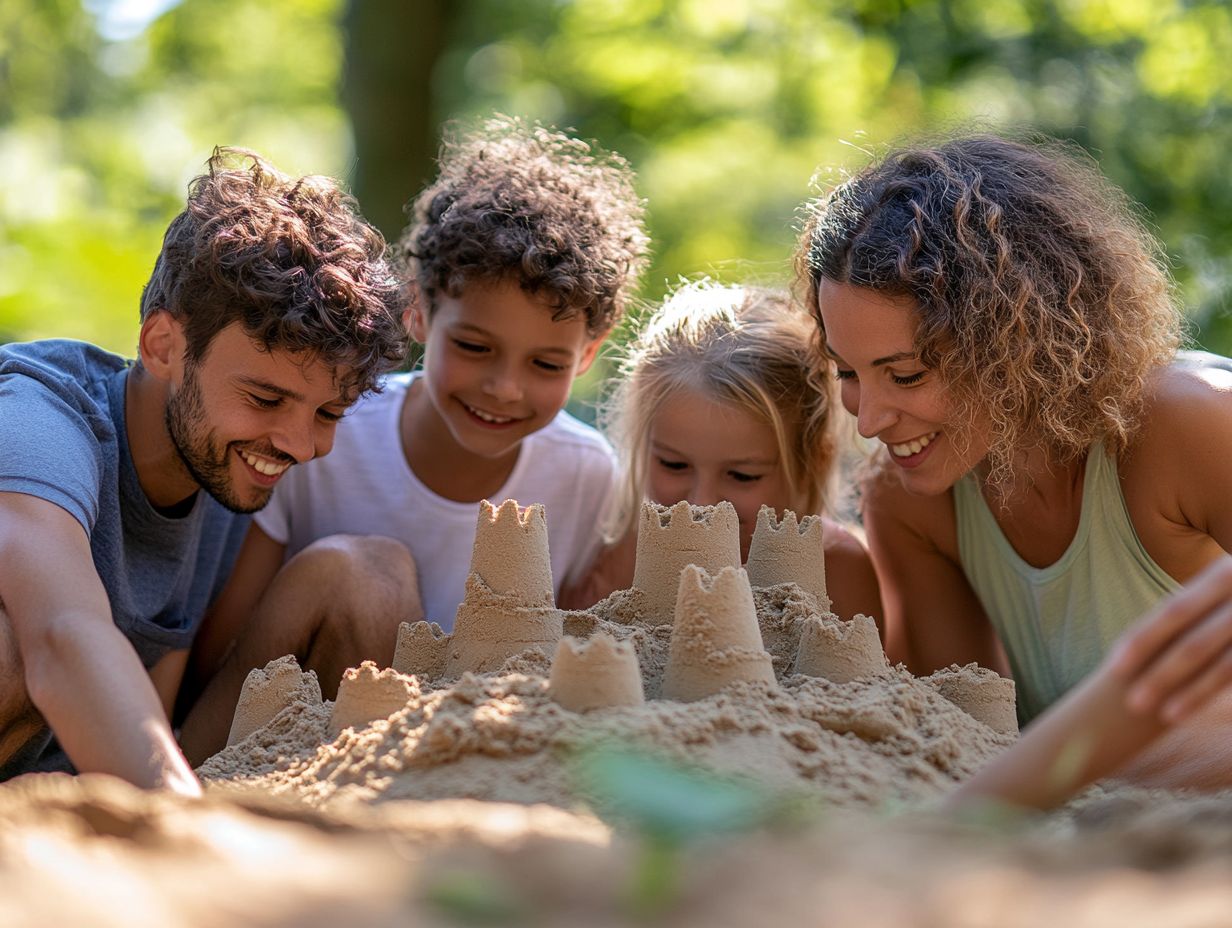
Teamwork has a remarkable way of sparking creativity and innovation in family activities, as collaborative efforts often lead to unique ideas and solutions. Engaging in playful challenges like creative skits or blind drawing allows you and your family members to express your artistic talents and think outside the box. These activities not only promote fun but also inspire innovation as each person learns to embrace the creative contributions of others, working together to create unforgettable experiences.
Through these collaborative projects, you’ll explore various art forms, from painting and crafting to making music. Imagine setting up a family art night where everyone contributes a piece to a larger mural; this can ignite conversations and result in a vibrant blend of ideas. Introducing character creation can add a fun twist to these activities.
Tackling problem-solving tasks, such as designing a family game or embarking on a fun DIY project, encourages brainstorming sessions that showcase the unique skills each individual brings to the table. Ultimately, these activities nurture a spirit of collective creativity, strengthening bonds while cultivating an environment where innovation can truly flourish.
How to Foster Teamwork in Family Activities?
Fostering teamwork in family activities requires you to set clear goals and expectations that guide each member toward a shared objective. By defining specific roles and responsibilities, you can ensure that everyone plays a part in the success of your endeavors, whether you re embarking on outdoor adventures or tackling DIY projects.
Encouraging open communication and highlighting the significance of active listening cultivates an environment where ideas can thrive. Moreover, as you celebrate your achievements and glean lessons from setbacks, you lay a solid foundation for enduring teamwork within your family. Effective communication exercises can further enhance this environment.
1. Set Clear Goals and Expectations for Family Time
Setting clear goals and expectations is essential for fostering effective teamwork in family activities, providing everyone involved with a sense of direction and purpose. When family members grasp their objectives, they can align their efforts toward achieving them, enhancing communication skills and ensuring that the benefits of teamwork are fully realized. This approach is particularly effective for family bonding and group dynamics.
Whether your aim is to complete a DIY project or dominate game night, having a shared vision encourages collaboration and engagement.
Establishing a framework that delineates roles and responsibilities can significantly boost confidence among family members, making each individual feel valued and invested in the outcome. This proactive approach not only reduces misunderstandings but also cultivates an environment where open dialogue thrives. Families learn to confront challenges together, transforming obstacles into opportunities for bonding. Incorporating icebreaker ideas can also facilitate smoother interactions.
As they navigate disagreements or differing opinions, they hone critical life skills that strengthen their relationships and forge lasting memories.
Ultimately, these practices enrich family life, paving the way for more harmonious interactions and deeper emotional connections.
2. Assign Roles and Responsibilities
Assigning roles and responsibilities in family activities elevates teamwork, ensuring that each member understands their unique contributions to the group s success. This approach not only fosters family bonding but also encourages effective communication, allowing everyone to express their thoughts and ideas. This is an excellent team-building exercise that enhances overall family dynamics.
When each person has a defined role be it cooking together or participating in sports activities the family’s collaborative efforts become more structured and productive.
Furthermore, this clarity inspires individuals to take ownership of their tasks, instilling a sense of accountability that can boost confidence and self-esteem. As family members work toward shared goals, the dynamics of their interactions often improve, transforming mundane tasks into enjoyable experiences.
The chance to celebrate one another’s strengths cultivates a supportive environment where open dialogue flourishes. Ultimately, designating roles not only streamlines the completion of activities but also deepens the underlying relationships, paving the way for a more harmonious home life.
3. Encourage Open Communication
Encouraging open communication is essential for fostering teamwork during family activities, as it creates a safe space for everyone to share their ideas and feelings. This practice enhances emotional connections and builds trust, allowing you to connect with your family on a deeper level. By cultivating an environment where every voice is valued and heard, you can work together more effectively, whether you’re enjoying outdoor adventures or engaging in indoor fun challenges.
This open dialogue not only strengthens your relationships but also fosters a sense of belonging and support among family members. When discussions center around each person s preferences and thoughts regarding family activities, you promote collaboration and creativity, turning simple outings into unforgettable experiences. Trust flourishes in an atmosphere where everyone feels empowered to contribute, encouraging even the shyest members to express their opinions.
Ultimately, these shared moments lead to joyful interactions and establish a solid foundation for a resilient family unit, capable of navigating challenges together. These shared moments are crucial for family bonding and building emotional connections.
4. Emphasize the Importance of Listening
Emphasizing the importance of listening is vital for cultivating teamwork in family activities, as it fosters better communication and relationship building. When you and your family members actively listen to one another, you can engage more meaningfully in discussions and decision-making processes, enhancing your teamwork experience during various activities.
This practice not only improves communication skills but also helps you work through challenges as a team, ensuring that everyone feels heard and understood.
By creating an environment where each individual s thoughts and feelings are valued, you can build trust and mutual respect within your family. Listening attentively not only encourages open dialogue but also gives the power to each member to contribute their unique perspectives, enriching the overall family dynamic.
As these collaborative efforts unfold, you will find that your problem-solving abilities strengthen, leading to more effective resolutions during conflicts or disagreements. Ultimately, the practice of listening becomes the foundation for stronger bonds, fostering an atmosphere where cooperation and love can truly thrive.
5. Celebrate Successes and Learn from Failures
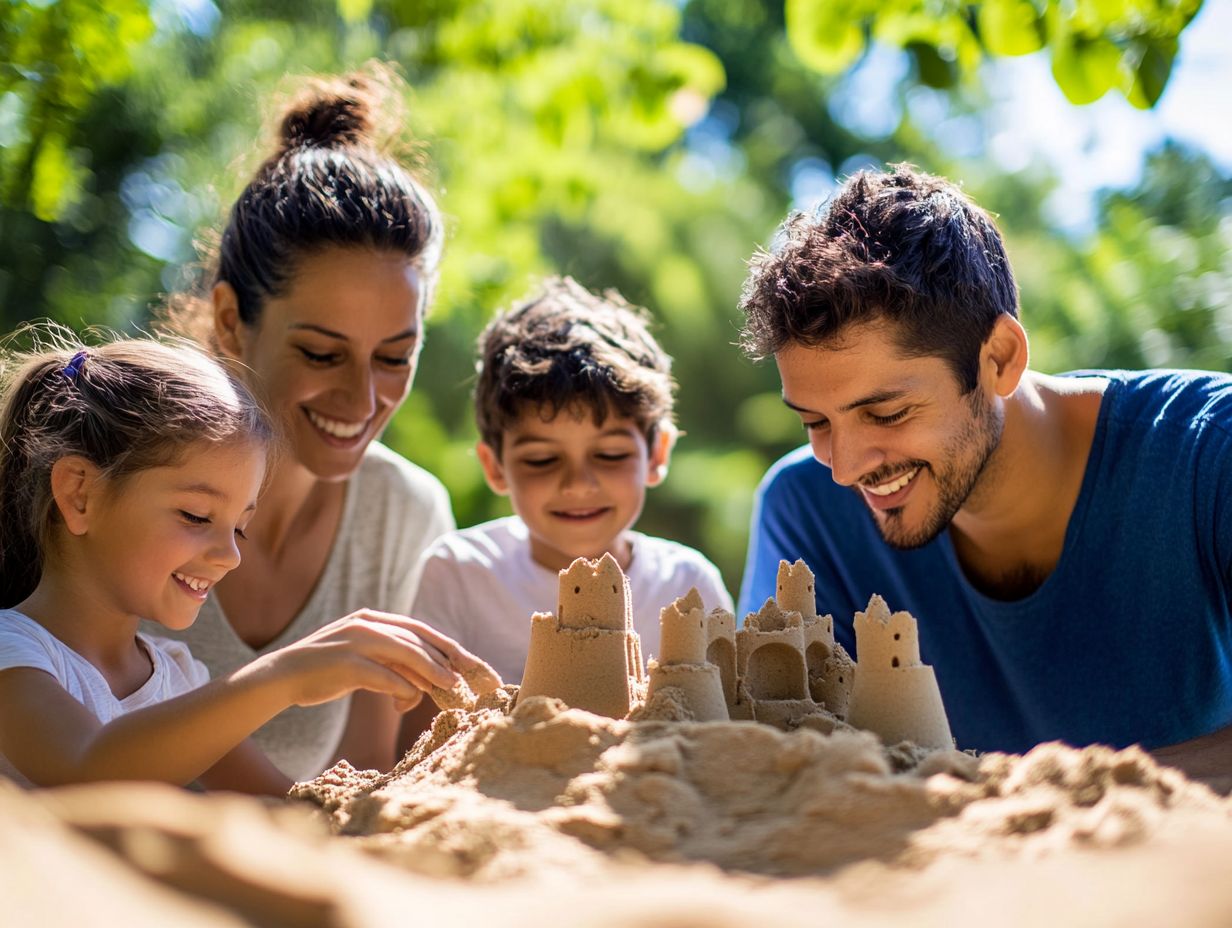
Celebrating successes and learning from failures are essential practices that can significantly enhance teamwork in your family activities. By taking the time to acknowledge achievements no matter how small you reinforce positive experiences that strengthen emotional connections and highlight the collaborative benefits of working together.
When you reflect on failures, you cultivate resilience and adapt future strategies, ultimately enriching your teamwork experiences. This approach fosters belonging among family members while promoting open communication and a supportive atmosphere.
Recognizing each individual s contributions during moments of triumph allows you to create lasting memories that bind your family closer together. Likewise, discussing setbacks without judgment helps normalize challenges, enabling everyone to express their feelings and thoughts in a constructive manner.
These shared experiences contribute to stronger relationships, ensuring that every family member feels valued and understood. As a result, you nurture a more cohesive and positive family dynamic that can withstand the test of time. Engaging in couples activities can also enhance the bond between partners within the family.
What are Some Family Activities that Promote Teamwork?
You can explore a variety of family activities that enhance teamwork, including scavenger hunts, cooking sessions, outdoor adventures, and community service projects. These experiences create fantastic bonding moments while encouraging you to collaborate and communicate effectively.
Whether you’re whipping up a cherished family recipe or tackling an obstacle course together, these activities cultivate trust, spark creativity, and hone problem-solving skills, ultimately enriching your family’s overall teamwork experience.
1. Cooking and Baking Together
Cooking and baking together transform into delightful family activities that significantly enhance teamwork and communication skills among all members. As you collaborate to prepare meals, you learn to share responsibilities, respect each other s ideas, and create delicious dishes all while having a great time.
These family fun activities are crucial for family bonding and trust-building. This experience sparks healthy competition and strengthens emotional connections, making mealtimes far more meaningful.
By working side by side in the kitchen, your family engages in creative problem-solving, fostering a sense of collaboration that extends beyond mere cooking. You have the opportunity to discuss recipes, experiment with new ingredients, and negotiate flavors, all of which promote open dialogue.
These shared moments invite laughter and bonding over successes and mistakes, further reinforcing your relationships. Engaging in fun challenges and playful activities during these times can make the experience even more enjoyable.
Ultimately, the kitchen evolves into a space for learning and growth, where delightful memories are infused into every dish, ensuring that these cherished experiences will be savored for years to come. This is a great example of indoor activities that strengthen family ties.
2. Outdoor Adventures and Sports
Engaging in outdoor adventures and sports activities offers you and your family an exceptional opportunity to bond and work together. Whether you’re hiking through scenic trails, kicking a soccer ball around, or navigating an obstacle course, these experiences challenge each family member to collaborate towards a shared goal.
Through physical engagement and enjoyable challenges, you can build trust, enhance communication, and create cherished memories that deepen your relationships.
Involving everyone in activities like canoeing or rock climbing not only encourages collaboration but also adds an exhilarating layer of competition that can be incredibly motivating and rewarding. Team sports cultivate essential life skills such as problem-solving and strategic thinking.
Adventurous pursuits like mountain biking or zip-lining promote encouragement and support among family members. As you tackle new challenges and celebrate achievements together, you’ll foster a sense of unity that transcends the mundane routines of daily life.
Engaging in fun collaboration helps strengthen family ties, ensuring that these shared experiences transform into treasured moments you’ll carry with you for years to come.
3. DIY Projects and Home Improvement Tasks
Collaborating on DIY (Do It Yourself) projects and home improvement tasks can be an incredibly rewarding way for you and your family to enhance teamwork and problem-solving skills. As you work together to tackle various projects, effective communication becomes essential.
You ll find yourselves assigning roles and sharing ideas, cultivating an atmosphere of cooperation and creativity. These shared experiences not only beautify your home but also strengthen your family bonds through collective achievements.
These activities introduce problem-solving skills and creative problem-solving techniques. Engaging in these collaborative efforts allows each of you to bring your unique strengths to the table whether it s your flair for creativity in design, your muscle for lifting heavy materials, or your knack for precision in measuring.
This division of tasks fosters mutual respect and understanding, enabling you to appreciate what each family member contributes. These kinds of family activities promote relationship building and team dynamics.
As you encounter challenges together, you ll learn to navigate conflicts, brainstorm innovative solutions, and celebrate your progress. The sense of accomplishment that arises from these experiences is deeply fulfilling.
The memories created during these projects can last a lifetime, serving as a testament to the invaluable nature of teamwork.
4. Game Nights and Puzzle Challenges
Dive into thrilling game nights that spark laughter and ignite teamwork among family members! Hosting game nights and diving into puzzle challenges can be a wonderfully entertaining way for you and your family to foster teamwork and enhance communication skills.
These activities encourage you and your loved ones to strategize, collaborate, and communicate effectively all while enjoying some quality fun. Whether you re engaged in board games, card games, or tackling puzzles together, you have the opportunity to strengthen bonds and develop essential teamwork skills in a relaxed, enjoyable setting.
These family activities are perfect for group collaboration and trust building. They create an inviting atmosphere where everyone feels at ease expressing their thoughts and ideas.
As family members navigate through various challenges together, such as fun challenges and creative problem solving, you ll discover an appreciation for each other s strengths and contributions, nurturing a sense of trust and mutual respect.
Game nights and puzzle challenges can also impart valuable life lessons, such as the importance of patience and adaptability, while fostering healthy competition and creativity.
Through these collective adventures, including scavenger hunts and family trivia, you not only cultivate meaningful conversations but also create lasting memories that enrich your family dynamic.
5. Volunteering and Community Service
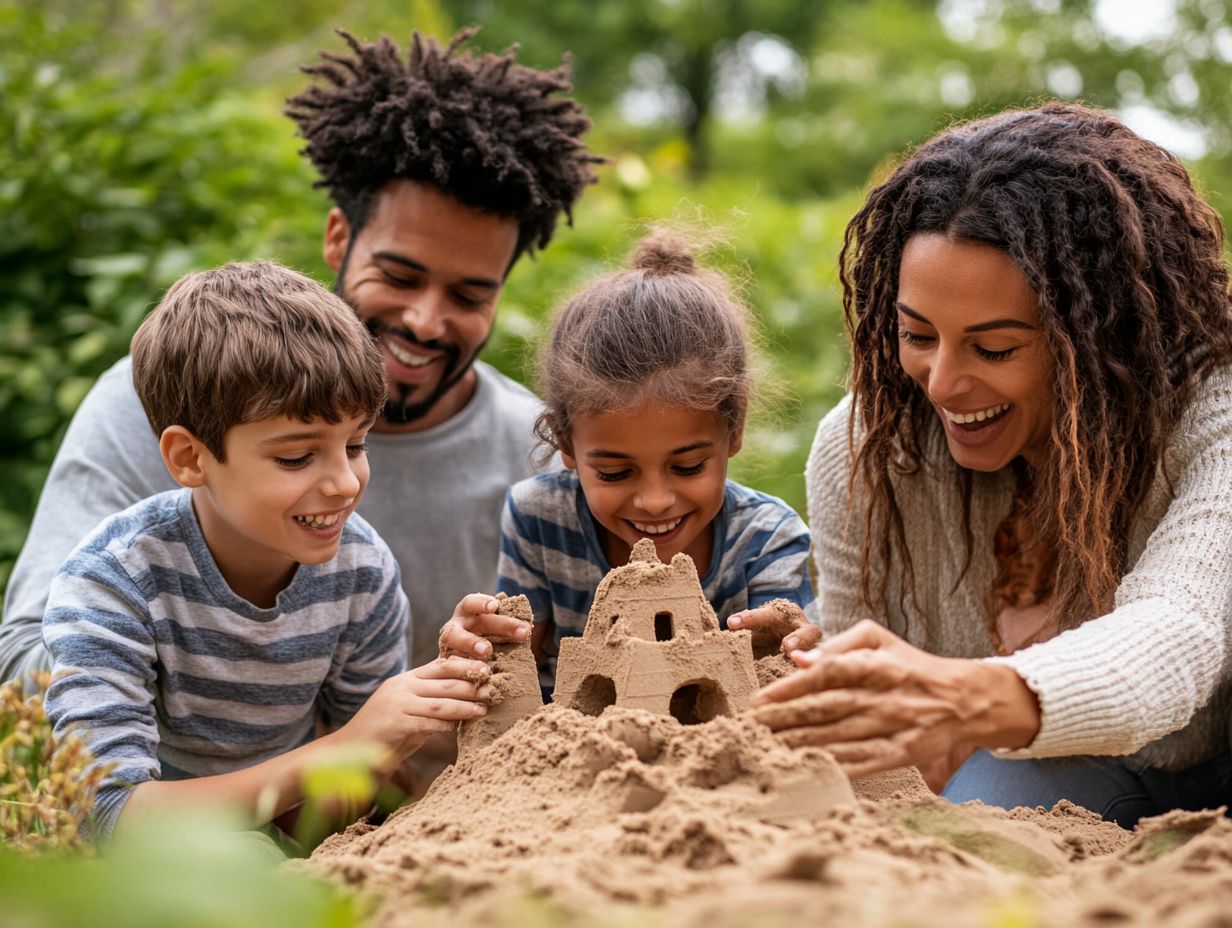
Volunteering and engaging in community service activities presents you with a meaningful opportunity to promote teamwork while giving back to society. These family bonding experiences can include indoor activities and outdoor activities.
These working together efforts not only strengthen your family bonds but also cultivate a sense of responsibility and empathy among all members, including teens activities and youth night events. By working together for a common cause, you can enhance relationship-building, communication skills, and problem-solving skills, ultimately making a positive impact in your community.
Participating in activities such as organizing a local food drive, joining park clean-ups, or setting family goals allows your family to experience the joy of making a difference side by side. Through these shared experiences, you and your family members can learn invaluable life skills like discussing and agreeing on solutions, communication exercises, problem-solving, and adaptability.
The diverse perspectives each person brings to the table enrich the overall experience, creating an environment of fun collaboration. Over time, these experiences help establish a culture of teamwork and team dynamics within your family, reinforcing the notion that together you can achieve more than you ever could apart.
This spirit of collective effort does not just benefit your family; it resonates throughout the community, inspiring others to join in and collaborate toward shared goals. This can involve couples activities and challenges together.
Frequently Asked Questions
By Julie David, Hilary Kinney, and George Karseras on the subject of Team Building and Family Activities.
How can I encourage teamwork in family activities?
One way to encourage teamwork in family activities is to assign roles and responsibilities to each family member. This will help everyone feel involved and contribute to the success of the activity.
What are some fun family activities that promote teamwork?
- Cooking or baking together
- Playing team sports
- Completing a puzzle
- Scavenger hunt
- Working on a DIY project
- Indoor activities
- Outdoor activities
- Icebreaker ideas
How can I get my children to work together during family activities?
To get your children to work together, try setting a common goal for the activity and emphasizing the importance of teamwork in achieving that goal. Activities like a rope challenge or obstacle course are a fun way to bring everyone together! Encourage relationship building through trust building exercises. You can also plan activities that require cooperation, communication, and problem-solving.
Why is teamwork important in family activities?
Teamwork is important in family activities because it promotes positive relationships, teaches valuable skills such as communication and problem-solving skills, and helps to build a sense of unity and belonging within the family.
What should I do if there is conflict between family members during an activity?
When conflict arises, address it calmly. Encourage open communication skills and remind everyone of the common goal. Work together to find a solution that satisfies everyone.
Can teamwork be taught through family activities?
Yes, teamwork can definitely be taught through family activities. Consider engaging in playful challenges or teamwork activities to foster these skills. By participating in activities that require collaboration and cooperation, children can learn the value of teamwork and how to effectively work together with others.
Start today and see the difference it makes for your family and community!



